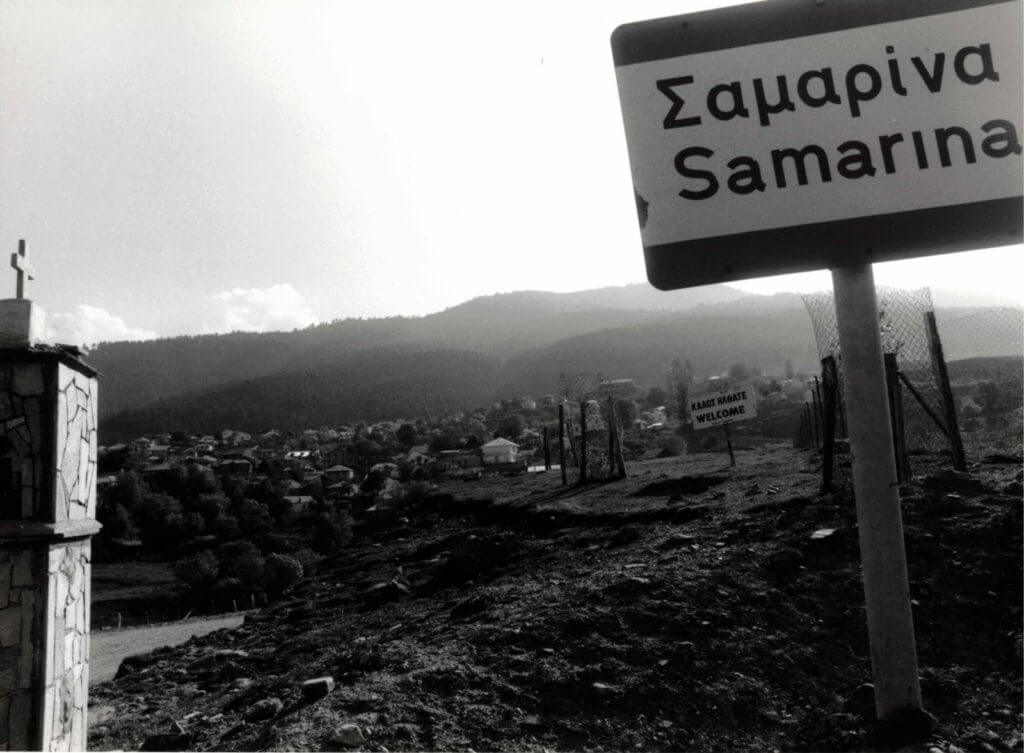Community News
We are pleased to welcome the following new members:
|
Dennis Adams |
Beaufort, SC |
|
Evgenija Colakovski |
Middle Village, NY |
|
Kenneth A. Bicki |
Belmont, NC |
|
James A. Bicki |
Matthews, NC |
|
Virginia T. Bicki |
Ormond Beach, FL |
|
Peter A. Vanghel |
Thompson, CT |
|
Petrica Dragati |
Worcester, MA |
|
Virginia R. Rockas |
W.Simsbury, CT |
We announce with great sadness the passing of Olimpia Vanghel Fatse, a pillar of our community and a staunch advocate of the Society Farsarotul. She was born in Korçë, Albania, and resided in Bridgeport, CT, since 1911. She was 91 and is survived by a large family. Dumnidzã s’u lieartã.
The plot of Odysseus’ Gaze, an award-winning 1995 film by Greek director Theo Angelopoulos, revolves around the Manakia brothers, Vlachs from Avdhella who were the first Balkan cinematographers. The action takes place in Korçë, Albania; Skopje, Macedonia; Constan_a, Romania; Belgrade, Yugoslavia; and Sarajevo, Bosnia, as a fictional Greek film maker tries to track down their very first film.
The Manakia brothers (Iannaki, 1878-1960, and Miltiadi, 1882-1964) are the subject of an ongoing Balkan comedy: Greeks claim them as Greeks, while Macedonians claim them as Macedonians. There is no question that their contribution to Balkan cinematography was extraordinary; between their first photograph, taken in Iannina in 1898, and their last, taken in Bituli in 1963, the Manakia brothers took more than 17,000 photographs and dozens of films, including many that recorded the way of life in Vlach communities at the turn of the century, including weddings and other rituals as well as the day-to-day work of shepherds, muleteers, and other members of the community.
This body of work is more important than it may seem at first glance. For most of its history, the Aromanian language was used far more for speaking than for writing. We therefore lack the extensive literature and literary tradition that other communities have used as a cultural resource. The Manakia collection may thus be one of the richest cultural resources available to us. It is a rare legacy from an era that is now forever gone.
Aromanians throughout the world are anxious for the extensive holdings of the archives in Macedonia and Greece to become more widely known and accessible. The warmer relations that now exist between the two countries may finally make this possible.
Only some 3 percent of Ireland’s 3.5 million people speak Gaelic; the rest speak English. A recent New York Times article noted that the Irish government is trying to promote the learning of Gaelic by investing $40 million a year in economic projects in Gaelic-speaking areas and $15 million a year in a new all-Gaelic television station. The Times interviewed one of the people involved in the television project, Katie Verling, who said, “Speaking Irish used to be considered terribly old-fashioned, associated with poverty…. Kids were ashamed of their Irish-speaking parents. The parents wanted them to concentrate on English… Now, in Dublin, there is a reawakening.”
The Aromanian community in Romania is making progress on several fronts: The library in Constan_a now has a Department of Aromanian Books. There are two printing houses, Cartea Aromân_ and Dimândarea, and several periodicals, including De_teptarea, Armânamea, Dimândarea, and Bana Armâneasca. There are regular radio programs in both Bucure_ti and Constan_a, as well as many working Aromanian singers and orchestras. There are also two children’s folk dance groups in Constan_a and one in Bucure_ti. And by the time our members read this, Aromanian may be being taught in Romanian schools. Without a doubt, Romania is doing much to preserve our culture and language.
A major exhibition of Byzantine Art will be featured at the Metropolitan Museum of Art in New York City from March 11-July 6, 1997. It’s not often that a major element of our cultural heritage is celebrated like this. It’s sure to be a popular show; call the Museum for details and ticket information.
The 13th annual festival of the Pan-Hellenic Union of Vlach Cultural Societies was hosted by the Vlachs of Metsovo again this past summer. We’re told it was a real success, attracting many people from throughout the Balkans. Those who watch Greek television in the United States saw thorough coverage of the event, including a clip of Greek conservative politician Andonis Samaras greeting attendees with a few phrases in Aromanian.
The Albanian government announced this summer that it would extend the teaching of Greek to the 11th grade at high schools in Gjirokaster, Delvine, and Sarande. But the number of Greek students in this region has declined as a result of immigration to Greece, leading some Albanians to question the need for this expense.
This summer courses in Aromanian were held in Kruševo in the Former Yugoslav Republic of Macedonia. Some 40 people attended from throughout the Republic.
Early this year, a delegation from the Vlach League of Macedonia attended a meeting of the Macedonian Parliament. The delegates told the President of Parliament, Tito Petkovski, “Studying our mother tongue, having Vlach language radio and TV programs and papers, are all results of democracy in the Republic of Macedonia.” They expressed satisfaction with their rights in the new nation.
This happy state of affairs may have been interrupted in November, however, when the Macedonian government denied the request of a group of Vlachs to re-assume their traditional names (Vlach names, like those of other ethnic groups, were Slavicized during the communist period). The government claimed that returning to original names would “alter the nationality structure” of Macedonia. The Helsinki Human Rights Watch group was informed of the situation.
The Union for Aromanian Language and Culture (ULCA) held its 4th Congress in Freiburg, Germany, on September 23-25, 1996. Speakers from all major Aromanian communities were featured. The ULCA publishes an informative periodical in Aromanian entitled Zborlu a Nostru. NOTE: the ULCA has a new address: Postfach 6305, D-79039 Freiburg I. Br., GERMANY.



Responses